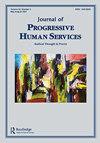公众利益,认可,以及同样的唯物主义结论:一篇抒情文章
IF 0.8
Q1 SOCIAL WORK
引用次数: 0
摘要
摘要在这篇抒情文章中,作者使用自动民族志调查,对拉丁裔父母在安全网服务、福利和计划方面的经历进行了定性研究。该研究得出结论,服务使用的核心是对依赖的矛盾心理;对依赖的矛盾心理的核心是对认可的渴望。本文的目的是交叉表达和探索这一发现,即在性别、种族和阶级的背景下。作者有意避免叙事连贯性,但以阿克塞尔·洪内斯的认知理论为指导框架。本文章由计算机程序翻译,如有差异,请以英文原文为准。
Public benefits, recognition, and the same old materialist conclusion: a lyric essay
ABSTRACT In this lyric essay, the author uses auto-ethnographic inquiry to re-contextualize a qualitative study of Latina parents’ experiences of safety net services, benefits, and programs. That study concluded that at the heart of service use was ambivalence about dependency; at the heart of ambivalence about dependency was the desire for recognition. The purpose of this article is to express and explore that finding intersectionally, i.e. in the context of gender, race, and class. The author deliberately avoids narrative coherence, yet relies on Axel Honneth’s theory of recognition as an orienting framework.
求助全文
通过发布文献求助,成功后即可免费获取论文全文。
去求助
来源期刊

Journal of Progressive Human Services
SOCIAL WORK-
CiteScore
3.20
自引率
8.30%
发文量
14
期刊介绍:
The only journal of its kind in the United States, the Journal of Progressive Human Services covers political, social, personal, and professional problems in human services from a progressive perspective. The journal stimulates debate about major social issues and contributes to the development of the analytical tools needed for building a caring society based on equality and justice. The journal"s contributors examine oppressed and vulnerable groups, struggles by workers and clients on the job and in the community, dilemmas of practice in conservative contexts, and strategies for ending racism, sexism, ageism, heterosexism, and discrimination of persons who are disabled and psychologically distressed.
 求助内容:
求助内容: 应助结果提醒方式:
应助结果提醒方式:


